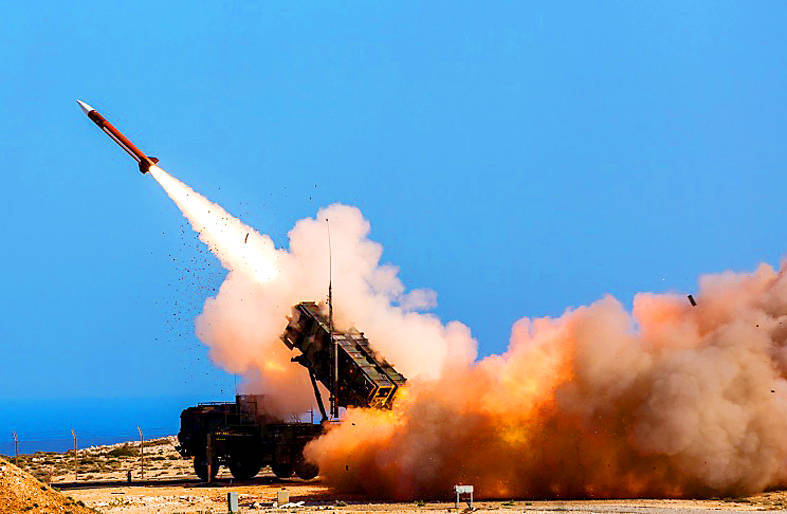《TAIPEI TIMES》 PAC-3 missiles ordered, paperwork challenged

A Patriot missile is launched at the NATO Missile Firing Installation in Chania, Greece, on Nov. 8, 2017. Photo: AP
SIGNATURE MISSING: The air force did not disclose how many of the missiles it wanted from the US, while the Control Yuan said there were ‘faulty procedures’
By Jake Chung / Staff writer, with CNA
The air force yesterday confirmed that it has requested the purchase of additional Patriot Advanced Capability-3 (PAC-3) Missile Segment Enhancement interceptors from the US to counter a growing Chinese threat to national security, while the Control Yuan sought corrections to the paperwork.
The missiles are to be delivered in 2025 or 2026, and be deployed by the end of 2026, the Ministry of National Defense said in a report to the Legislative Yuan.
Sources in the air force declined to comment on budget allocations for the missiles, or the number to be purchased.
The report said that the request was made in 2019.
The missiles’ “revolutionary two-pulse solid rocket motor provides increased performance in both altitude and range while employing the same proven hit-to-kill,” said the Web site of Lockheed-Martin, which manufactures the weapons system. “The two-pulse solid rocket motor and enhanced airframe gives the interceptor more maneuverability against faster and more sophisticated tactical ballistic missiles and cruise missiles.”
Taiwan received its first PAC-2 systems in 1997, with upgrades to PAC-3 being implemented since 2007.
Taiwan has deployed more than 400 PAC-3 missiles.
However, the Control Yuan passed a motion to issue the ministry with a corrective measure notice, citing “faulty procedures” regarding the paperwork for the purchase of the missiles.
The military issues regular recertification requests to the US to keep its equipment up to date and well-maintained, the Control Yuan said, but added that the 2019 request for yesterday’s proposed purchase had not been signed by the minister of national defense.
The legislature only learned of the purchase proposal after it was approved for committee hearings at the US Congress, a Control Yuan report said, adding that it has issued the corrective measure notice so that it could oversee changes to administrative procedures for arms purchases.
Separately, the ministry also confirmed that the Chungshan Institute of Science and Technology has fulfilled its quota for this year of 23 Tien Kung (Skybow) 3 missiles.
The ministry had commissioned the institute to provide Skybow missiles yearly from 2015 to 2024, in a NT$74.83 billion (US$2.62 billion at the current exchange rate) contract.
President Tsai Ing-wen (蔡英文) in 2019 asked the institute to expedite production of the Tien Kung and Hsiung Feng missiles series without sacrificing quality.
Institute for National Defense and Security Research senior analyst Su Tzu-yun (蘇紫雲) told the Central News Agency that Skybow-3s have a higher intercept altitude than PAC-3s, although the PAC-3s have better precision.
The systems complement each other, Su said.
新聞來源:TAIPEI TIMES



















